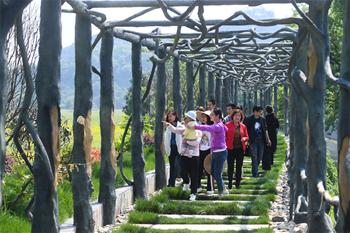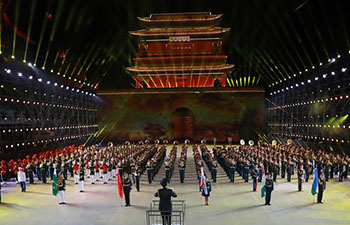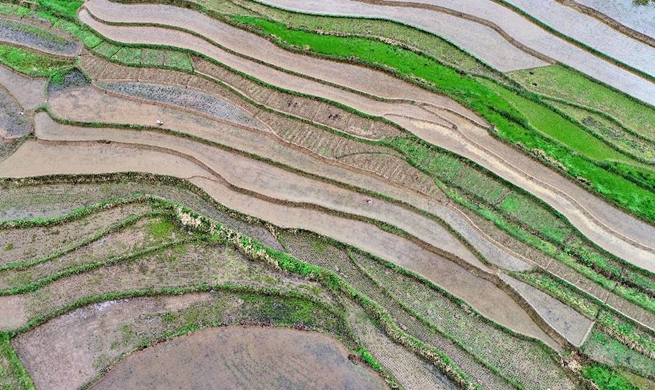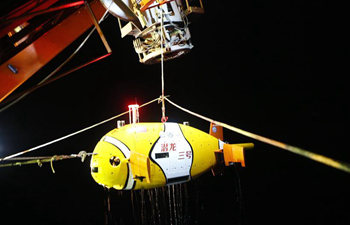UNITED NATIONS, April 25 (Xinhua) -- A UN official has depicted a bleak picture of the humanitarian situation in Syria and asked for full access to people in need.
"After seven years of conflict that continues to see escalation after escalation, the needs of Syrians have never been higher," UN Assistant Secretary-General for Humanitarian Affairs Ursula Mueller told the Security Council on Wednesday.
Of the 13.1 million people in need, some 5.6 million are in acute need, she said.
Despite the adoption of UN Security Council Resolution 2401 in February that demanded a cease-fire across Syria, attacks on civilians and civilian infrastructure have reached some of the highest levels since the conflict began, she said.
In the first three months of 2018, the United Nations has verified 72 attacks on health facilities, compared with 112 attacks in all of 2017, said Mueller.
At the same time, cross-line humanitarian access remains extremely constricted, with only five convoys deploying so far in 2018, she said.
While Eastern Ghouta is no longer besieged as it has come under the control of the government of Syria, the United Nations has not been granted access to Douma, where an estimated 70,000 individuals remain in dire need of humanitarian assistance after years of besiegement and months under intensified shelling and airstrikes, she said.
The United Nations was last permitted to reach Douma in Eastern Ghouta on March 15, with food assistance only for 26,100 individuals.
More than 160,000 people left Eastern Ghouta between March 9 and April 15 following weeks of fighting, she noted.
There has been an alarming escalation of violence between government forces and non-state armed opposition groups in northern rural Homs and southern Hama governorate impacting an estimated 210,000 people in the area, said Mueller.
The United Nations has received reports of airstrikes and ground-based strikes resulting in scores of civilian casualties, destruction of civilian infrastructure and displacement, she said.
The situation in the northern governorate of Idlib remains catastrophic, with almost 400,000 people displaced since mid-December, in addition to tens of thousands who were displaced from the south, including Eastern Ghouta, she said.
"There are simply no more sites or shelters available for the vast majority of new arrivals. There has been a 25 percent increase in Idlib's displaced population than a year ago, with 1.2 million of the 2 million people in the governorate now displaced, many of them multiple times,"she added
This extreme situation places incredible pressure on the host communities. In addition, in recent weeks, airstrikes have hit hospitals and markets, and have come very close to shelters for internally displaced persons, reportedly killing scores of civilians, including many women and children, she said.
In neighboring Aleppo governorate, between mid-January and mid-March, an estimated 137,000 people were displaced by hostilities in Afrin district, and freedom of movement remains an issue for those who have been displaced, said Mueller.
While there have been some reports of returns taking place to Afrin, the movement back to Afrin also remains extremely limited as people are allegedly prevented from returning, she said.
Late last week, hostilities between government forces and the Islamic State (IS) terrorist group in the besieged area of Yarmouk and neighboring areas in the far northeastern corner of the country have resulted in reports of civilian casualties and destruction of civilian infrastructure. The access points for over 66,000 people in need are virtually closed, she said.
On April 1, the United Nations undertook an assessment mission to Raqqa in the north. Since the IS was forced out of Raqqa in October 2017, nearly 100,000 people have returned to Raqqa city. However, conditions are not conducive for returns due to the high levels of unexploded ordnance and improvised explosive device contamination, widespread and severe infrastructural damage, and a lack of basic services, said Mueller.
Every week, there have been over 50 casualties reported due to remnants of war. An estimated 70 to 80 percent of all buildings inside Raqqa city are destroyed or damaged, she said.
While public services are slowly resuming, the city lacks electricity and mobile communications, and water is only pumped at a very limited capacity to the outskirts of the city. Up to 95 percent of households who have returned to Raqqa are food insecure, she said.
Some 50,000 people in Rukban along the Syria-Jordan border remain in critical need of assistance, having last been provided aid from Jordan in January, she said.
The United Nations is working to deliver assistance directly to people in need. At the same time basic health services and water continue to be provided from Jordan, she said.
Mueller called for firm steps to ensure that all parties respect the rules of war.
"Civilians must be provided protection, with constant care taken to spare them and the infrastructure they rely on. Attacks on hospitals in particular must end. The wounded and the sick must be afforded the treatment and care they need," she pointed out.
She asked for safe, sustained and unimpeded access to all people in need. In addition, when convoys deploy, she said, medical items must stop being removed.
She added that "there is no reason why items previously agreed with the authorities for delivery are removed at the last minute. These are critical life-saving items, and they must be allowed on our trucks."

















